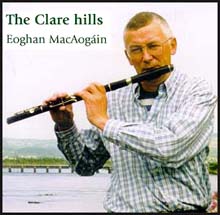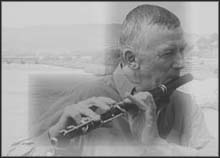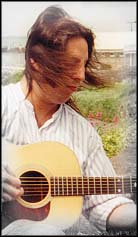 The Clare Hills is
Eoghan MacAogháin's second album.
Sounds
The beginning of
"The Clare Hills"
Tunes 1-13
- The Clare hills
(E. MacAogáin) (air) (3.32)
- A fig for a kiss / Kitty come
down from Limerick (slip jigs) (3.07)
- Casadh an tsúgáin (air)
(3.25)
- Rolling on the rye-grass /
The traveller (reels) (2.50)
- ‘Sé fáth
mo bhuartha (air) (2.56)
- Woman on telephone /
Fast and furious (E. MacAogáin) (reels) (3.03)
- The
banks of my own lovely Lee (air) (2.33)
- My
father’s house (B. O’Connor) (song) (5.43)
- An chúilfhionn (air)
(2.50)
- The
Derry hornpipe / The standing Abbey (hornpipes) (3.18)
- The mountains
of Pomeroy (air) (2.39)
- Tá mé ‘mo chodladh
‘s ná dúisigh mé (air) (3.08)
- Seán Ó
Duibhir an ghleanna (air) (2.52)
 The Clare hills: The Clare hills:
A slow air that I wrote in my long-time home Limerick. From
the city the Clare hills can be seen across the River Shannon.
(E. MacA.: D flute; G. McN.: guitar)
A fig for a kiss / Kitty come down
from Limerick
Two well-known, but beautiful, slip-jigs.
The first one in Irish contains the following words:
"rinnce ‘s ceol bíodh againne ….. ‘s blasfaimid beola na mban"
(E. MacA.: Eb flute; B. W.: fiddle; G. McN.: guitar)
Casadh an tsúgáin
The air of the song about the twisting of the súgán, or
hay-rope. The unfortunate suitor (a bard) was twisted out the door by the old woman. She
slammed the door and then threw his harp out the window after him.
The song, or a version of it, is also known as "An Súisín Bán".
(E. MacA.: Eb flute)
Rolling on the rye-grass /
The traveller
Two well-known reels. See O’Neill’s 1001 nos. 766
and 719.
(E. MacA.: Eb flute; B. W.: fiddle; G. McN.: guitar)
‘Sé fáth
mo bhuartha
The reason for my sorrow is that I’m not allowed to
visit the lonely glen where my love dwells.
(E. MacA.: Eb flute; G. McN.: guitar)
Woman on telephone /
Fast and furious
Two reels of my own. The first title describes the sound,
the second how it should be played.
(E. MacA.: Eb whistle; G. McN.: guitar, bouzouki)
The
banks of my own lovely Lee
This one is for Dadmór (from Cork).
"The maid with her lover the wild daisies pressed
On the banks of my own lovely Lee."
(E. MacA.: Eb flute; G. McN.: guitar)
My
father’s house
A song from the pen of Kerryman Batt O’Connor. About
the song: it’s all true, and that’s not a word of a lie.
(B. O’C.: vocals, guitar; E. MacA.: Eb whistle; G. McN.: bouzouki)
An chúilfhionn
 According to Bunting this air may
be referable to the "remote period" of the 13th century. According to Bunting this air may
be referable to the "remote period" of the 13th century.
Dubhglas de h-Íde: "Níl aon amhrán i n-Éirinn is mó clú ná an
‘Chúilfhionn’ ..."
A couplet:
"... A Neilidh, a ghrá-sa, an dtiocfá liom faoi shléibhtigh,
Ag ól fíona a’s bolcáin a’s bainne an ghabhair ghlé-gil. ..."
Dinneen gives the following explanations:
"bolcán: ... a strong drink; spirits made from black oats and used by the poorer
classes"
"Cúilfhionn: a fair-haired, handsome person; a fair lady"
(E. MacA.: Eb flute; G. McN.: bouzouki)
The Derry hornpipe / The standing Abbey
Willie Clancy had a version (with 5 parts) of the first
tune. The second tune I learned from my mother: it is slightly different from the Séamus
Ennis version.
(E. MacA.: Eb whistle; G. McN.: guitar)
The mountains
of Pomeroy
The air is traditional: see O’Neill’s Music of
Ireland No. 540.
The following lyrics were written by Dr. George Sigerson:
".... And a pale drowned bride met Renardine,
On the mountains of Pomeroy."
(E. MacA.: D flute; G. McN.: guitar; M. C.: didjeridu)
Tá mé ‘mo chodladh ‘s
ná dúisigh mé
Enough to send anyone to sleep.
 John and William Neal’s "A
Collection of the Most Celebrated Irish Tunes" Dublin (1724) contains a (different)
tune called "Ta me ma Chulla’s na doushe me". The only known existing copy
of this work (available though the Nicholas Carolan edition) has the following comment
written above the first stave of this tune: "In One Sharp you beast" (the tune
appears to be printed with the wrong key signature). John and William Neal’s "A
Collection of the Most Celebrated Irish Tunes" Dublin (1724) contains a (different)
tune called "Ta me ma Chulla’s na doushe me". The only known existing copy
of this work (available though the Nicholas Carolan edition) has the following comment
written above the first stave of this tune: "In One Sharp you beast" (the tune
appears to be printed with the wrong key signature).
(E. MacA.: D flute; G. McN.: guitar)
Seán Ó
Duibhir an ghleanna
 Donal O’Sullivan: "John O’Dwyer of the Glen was the
third son of Darby O’Dwyer (died 1629), who was chief of the O’Dwyers of
Kilnamanagh and lived at Cloniharp Castle, now a ruin, near Dundrum, County Tipperary. The
glen from which John O’Dwyer took his epithet "an ghleanna" is a matter of
uncertainty, and it has been variously supposed to be the Glen of Aherlow at the base of
the Galtee Mountains, Glenough, in the parish of Clonoulty and Glenefy near
Galbally." Donal O’Sullivan: "John O’Dwyer of the Glen was the
third son of Darby O’Dwyer (died 1629), who was chief of the O’Dwyers of
Kilnamanagh and lived at Cloniharp Castle, now a ruin, near Dundrum, County Tipperary. The
glen from which John O’Dwyer took his epithet "an ghleanna" is a matter of
uncertainty, and it has been variously supposed to be the Glen of Aherlow at the base of
the Galtee Mountains, Glenough, in the parish of Clonoulty and Glenefy near
Galbally."
The song contains the phrase: "An sionnach rua ar an
gcarraig". If you listen you can hear the fox!
(E. MacA.: D flute; G. McN.: guitar; M. C.: didjeridu)
Tracks 1 and 6 were composed and
arranged by E. MacAogáin.
Track 8 was composed and arranged by B. O’Connor.
All other tracks were arranged by E. MacAogáin
The
Instruments
Eb flute by Besson and Co.,
19 Euston Road, London (No. 8387) : simple system eight-keyed blackwood flute
D flute by Rudall and Rose, No. 15 Piazza,
Covent Garden, London (No. 926) : Sotheby’s: "An eight-keyed boxwood flute,
London, circa 1830. Silver mounts, silver keys with salt spoon cup covers, the C and C#
keys with pewter plugs, tuning slide and graduated stopper."
Eb whistle by Generation
guitar (G. McN.) by Hohner (Gruhn design)
guitar (B.O’C.) by Guild
bouzouki by Joe Foley, Dublin
 didjeridu : (1996) an unstopped piece of
termite-hollowed Bloodwood (Eucalyptus) in the key of D didjeridu : (1996) an unstopped piece of
termite-hollowed Bloodwood (Eucalyptus) in the key of D
fiddle : not much information available
about this fiddle but it has four strings and four pegs
Many thanks to the Irish Traditional
Music Archive.
|

